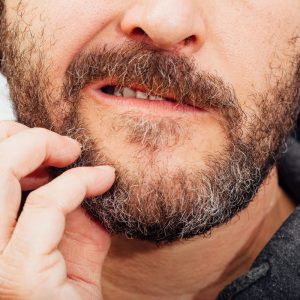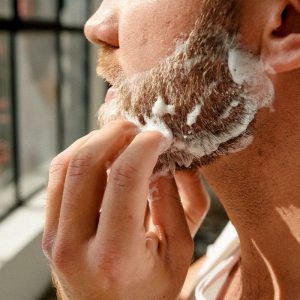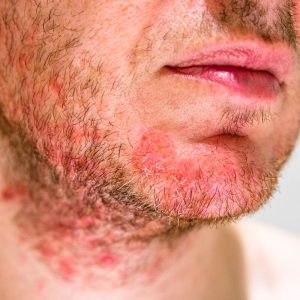Bart juckt? Unsere Tipps gegen nervigen Juckreiz
Kratzen ist keine Lösung. Auch wenn du keinen Ausweg mehr siehst, lass’ dir von uns helfen!
Nerviges Jucken im Bart will keiner, und trotzdem plagt es uns immer wieder – die einen mehr als andere. Dein erster Gedanke ist wahrscheinlich, einfach abrasieren und gut ist. Aber bevor du das machst, versuch es doch erstmal mit unseren Tipps und Tricks. Eine wichtige Info schonmal vorab: es ist nicht der Bart, der juckt, sondern die Haut darunter. Der Schlüssel zur Bekämpfung des Juckreizes liegt in der richtigen Bartpflege. Da es aber mehrere Ursachen gibt, gibt es leider keine ohne-fits-all Lösung.

Häufige Ursachen für Juckreiz im Bart
Um die perfekte Lösung für dich zu finden, solltest du dir erstmal der Ursache bewusst werden. Wir haben dir mal die häufigsten und gleich ein paar Tipps dazu aufgelistet.
Ursache#1: Zu trockene Gesichtshaut
Vor allem im Winter wird die Haut durch Heizungsluft und im Sommer durch Hitze und die Klimaanlage ausgetrocknet. Hinzu kommt häufig noch Duschgel, dass leider immer wieder mit einem Bartshampoo “verwechselt” wird. Das trocknet deine Gesichtshaut zusätzlich stark aus, da Duschgel dafür gedacht sind, komplett zu entfetten und zudem einen anderen pH-Wert besitzt. Aber auch zu heißes Wasser unter der Dusche oder beim Waschen und Föhnluft sowie zu wenig Flüssigkeitsaufnahme begünstigen eine trockene Haut

Ursache#2: Abgenutzte Rasierklingen
Abgestumpfte Klingen fördern Rasurbrand und eingewachsene Haare, was wiederum zu Juckreiz führt. Je nach Klingen Qualität sollte diese häufig gewechselt werden – und häufig bedeutet nicht 1-2 mal im Jahr! Je nach Anwendung alle 3-5 oder spätestens alle 14 Tage sollte eine neue Klinge genutzt oder das Rasiermesser geschärft werden. Wenn du dir unsicher bist, ob es schon Zeit für eine neue Klinge ist, achte penibel darauf, ob sie deine Haare noch ordentlich schneidet oder mehr rupft.

Ursache#3: Bakterien & Schuppen
Täglich sammeln sich Bakterien und Hautschuppen in deinem Bart. Hört sich aber erstmal schlimmer an, als es ist. Durch ständiges ins Gesicht-gefasste kommen Mikroben in den Bart und bleiben dort erstmal. Das kannst du aber ganz easy lösen. Ein anderer Punkt sind Schuppen. Das, was du vielleicht schon von deiner Kopfhaut kennst, findest du manchmal auch im Bart. Wenn du mehr zu diesem Punkt wissen möchtest, schau einmal hier vorbei.

Ursache#4: Eingewachsene Haare
Oftmals sind eingewachsene Haare ein Resultat einer unglücklichen Rasur und einem Rasurbrand. Die sind nicht nur unangenehm und optisch weniger ansprechend, sondern durch die Entzündung ganz schön jucken oder sogar schmerzen.
Was tun, wenn der Bart juckt?
Du weißt nun, warum dein Bart juckt – was du dagegen tun kannst, sagen wir dir jetzt.
Tipp #1: Waschen und pflegen
Oftmals hilft es schon, ein richtiges Bartshampoo oder feste Bartseife zu verwenden und anschließend ein gutes Bartöl einzumassieren. Kokosnuss-, Jojoba-, CBD – und Arganöl sind hier super Basisöle. Vor allem bei trockener Gesichtshaut und Bakterien ist das besonders wichtig. Bei empfindlicher Haut sollte deine Wahl erstmal auf ein CBD-Öl basiertes Pflegeprodukt fallen. Gründlich waschen und ausreichend pflegen löst hier meistens schon das Problem. Wasche dein Gesicht neben Wasser auch mit einem Waschgel, beispielsweise mit CBD bei anspruchsvoller Gesichtshaut oder mit Tonerde für den sanften Peeling-Effekt. Letzteres hilft vor zudem bei eingewachsenen Haaren.

Besonders bei trockener oder sehr trockener Gesichtshaut ist unser 2-in-1 Bart Softener oder auch ein anderer Conditioner nach dem Waschen super! Dann noch Finger aus dem Gesicht und du auf keinen Fall kratzen. Falls Öl nicht dein Go-to ist, versuche es doch mal mit einer 2-in-1 Bart- und Gesichtscreme. Dabei sparst du auch noch Zeit bei deiner Bartpflege Routine. Solltest du eingewachsene Haare haben, greif’ zu einem Peeling und integriere dieses ab und zu in deiner Routine. Mehr Tipps zur perfekten Gesichtspflege Routine findest du hier.

Tipp #2: Rasierklinge wechseln und eventuell trimmen
Dass du Rasierklingen wechseln musst, weißt du jetzt ja schon. Und das meinen wir ernst! Denn dadurch beugst du zudem auch eingewachsene Haare und Rasurbrand vor. Auch regelmäßiges Trimmen ist wichtig. Ja, wir sagen dir immer beim Bart wachsen lassen: Finger weg vom Rasierer, aber auch, dass du Konturen schneiden und trimmen darfst. Natürlich nicht in den ersten Wochen. Hat dein Bart aber schon eine beträchtliche Länge und Dicke erreicht, feel free to trim a bit.

Tipp #3: Bürsten
Zudem ist eine Bartbürste und ein Bartkamm dein bester Freund. Gerne täglich mit Gefühl und wenig Druck mit der Bürste über deinen Bart gehen, denn das massiert zum einen die Haut und regt die Blutzirkulation an. Außerdem verteilt es den Talg deiner Haut und lässt deine Barthaare ordentlich aussehen. Das ist besonders in der anfänglichen Wachstumsphase super, da du so ohne rasieren oder trimmen den Juckreiz “wegbürsten” kannst. Ach ja, die Bürste müsstest du aber auch regelmäßig reinigen, Haare entfernen und mit Wasser und Seife waschen.

Tipp #4: You are what you eat
Das hörst du sicherlich nicht zum ersten Mal, aber was du isst, beeinflusst dich sehr. Nicht nur den Juckreiz, sondern auch das Bartwachstum kannst du so sogar unterstützen oder mildern. Bei zu trockener Gesichtshaut hilft es folgende Lebensmittel einfach mehr und bewusster in den eigenen Speiseplan zu integrieren:

Kokosnuss(öl)
Kokosnuss(öl): die gesunden Fette der Frucht spenden deiner Haut Feuchtigkeit - von innen heraus.
Süßkartoffel
Ihr Vitamin A hilft deiner Haut, sich zu erneuern und dabei trockene Haut vorzubeugen. Vor allem im Winter sollten sie Platz in deinem Speiseplan finden - denn das in ihr enthaltene Vitamin C stärkt dein Immunsystem.
Avocado
Die Superfrucht, dieses mittlerweile in jedem Café mindestens einmal auf eine Instagram-Story schafft. Neben ihrem leckeren Geschmack wirken Avocados dank ihrer gesunden Fette, Proteine und Vitamine beinahe Wunder!
Olivenöl
Auch hier verdanken wir einem Vitamin den positiven Einfluss auf deine Haut - Vitamin E. Dieses Öl findet sich deswegen auch in vielen Skincare Produkten, aber auch im Salat spendet es deiner Haut von innen heraus Feuchtigkeit.
Karotten
Nicht nur gut für deine Augen und zur Erhaltung des Sommer-Teints, sondern auch für die Kollagenproduktion. Warum das wichtig ist? Das Strukturprotein sorgt für die Festigkeit und Elastizität deines Bindegewebes. Zusätzlich finden wir auch hier essenzielle Vitamine C und A.
Früchte
Alle Früchte, die einen hohen Wasseranteil und wenig Zucker haben. Zum Beispiel Beeren oder Kiwis sind super, da sie neben toller Vitamine auch viel Wasser liefern. Auch wenn trinken genauso wichtig ist, so kannst du dein Wasser auch “essen”. Auch Zitrusfrüchte bieten sich hier sehr an!
Nüsse und Samen
Reich an Omega-3-Fettsäuren, Vitaminen A, B und E, einfach ungesättigten Fettsäuren, Mineralstoffen und Antioxidantien stärken sie deine Hautbarriere, unterstützen die Elastizität und Feuchtigkeit deiner Haut, sowie die Regeneration deiner Zellen. Auch wenn die Nährstoffe in Samen und Nüssen der Wahnsinn sind, solltest du vor allem Nüsse in moderaten Portionen konsumieren.
Tee
Genauer gesagt, grüner Tee. Voll mit Antioxidantien hilft es deiner Haut dabei, beschädigte Teile zu heilen.
Wasser
Wie schon erwähnt, ist ausreichend trinken das A&O. Leider zählt Kaffee und Bier nicht dazu, sorry. Sollte dir Wasser nicht schmecken (soll’s ja geben), press dir doch ne halbe Zitrone aus und gib sie zu deinem Wasser dazu, in Kombination mit Minze schmeckts übrigens besonders gut!
Auf welche Vitamine sollte ich achten?
Vitamin C und E fördert die Produktion einer Art körpereigenes Öl, welches deine Haare und Gesichtshaut ganz von selber befeuchtet. Vitamin A soll sogar das Haarwachstum fördern – denn eine gesunde Haut schafft ideale Bedingungen für einen vollen Bart. Omega-3-Fettsäuren beugen insbesondere Juckreiz vor und bewahren Haut und Haare davor, trocken und brüchig zu werden.

Tipp #5: Take care of your skin
Durch Lebensmittel von innen heraus die Haut unterstützen ist wichtig, aber zudem solltest du nicht vergessen, dass deine Haut ist das größte Organ ist und du über sie Nährstoffe genauso aufnimmst. Nüsse auf die Haut und den Bart schmieren ist natürlich schwieriger, als sie zu essen, aber Kokos- und Mandelöl findest du beispielsweise in vielen Bart- und Gesichtsölen.
Solltest du Kosmetik kaufen, achte bitte auf die Inhaltsstoffe! Chemische Wirkstoffe haben da nichts zu suchen und trocknen deine Haut auf lange Sicht nur noch mehr aus, dann brauchst du mehr Öl und schon bist du in einem Teufelskreis und dein Bart juckt nur noch mehr.

Zertifizierte Naturkosmetik ist schonmal ein super Anhaltspunkt! Argan-, Jojoba,- Rizinus und CBD-Öl sind zusätzlich gern genutzte und tolle Öle für Haut und Haar. Vor allem letzteres solltest du unbedingt mal ausprobieren, wenn du eine empfindliche und trockene Haut hast. Denn Cannabidiol fördert die Regeneration, unterstützt den Aufbau einer gesunden Hautbarriere und reduziert Juckreiz. Zudem wachsen feuchte und weiche Barthaare weniger wahrscheinlich ein. Wie oben schon genannt, muss es aber nicht unbedingt ein Öl sein, es gibt auch tolle Cremes.
Du kannst dir auch selber eine Bartkur oder Gesichtsmaske aus Hausmitteln anmischen, dafür übernehmen wir aber keine Garantie. Avocado, Olivenöl und Zitrone soll zum Beispiel eine gute Kombi sein und wenn wir uns mal die Wirkstoffe der einzelnen Lebensmittel anschauen klingt das auch gut. Aber hey, probieren geht über studieren, nicht wahr? Falls du da mal was anmischen solltest, gib uns gern Feedback!

Sharing is caring!
Leidest du auch unter einem juckenden Bart? Was ist dein bester Tipp? Wir freuen uns, von dir auf facebook und Instagram zu hören!
Dein(e) Brooklyn Soap Team/Academy
FAQs
Was tun, wenn der Bart juckt?
Am besten findest du erstmal heraus, warum dein Bart juckt. Das macht den nächsten Schritt nämlich viel effektiver. Je nachdem, was der Grund für deinen Juckreiz ist, solltest du mal 1-2 (oder mehr) unserer Tipps ausprobieren! Sollte der Juckreiz nach einiger Zeit trotzdem nicht besser werden, frag mal deinen Hautarzt, ob er dir eine speziell auf deine Gesichtshaut zugeschnittene Creme anmischen lassen kann oder andere Tipps für dich hat. Es kann auch an einer Unverträglichkeit auf ein Produkt, Lebensmittel etc. sein.
Warum juckt der Bart beim Wachsen?
Bartjucken entsteht so: Beim Rasieren entsteht eine scharfe Kante an deinem Barthaar, die dann an deiner Haut kratzt. Deine Haut raut dadurch auf und fängt an zu jucken. Die Kante entsteht durch jede neue Rasur wieder und juckt nur noch mehr. Deswegen sagen wir: Lass’ deinen Bart wachsen und unterstütze ihn dabei. Zudem wird deine Haut durch die Rasur und Alltags Einflüsse gereizt und strapaziert, dann kommen eventuell noch die scharfen, geschnittene Haare dazu.
Wie lange kratzt der Bart?
Das kommt auf die Ursache an. Liegt es ausschließlich an deiner trockenen Haut, kratzt er so lange, bis deine Haut eben nicht mehr ausgetrocknet ist. Und das ist auch keine einmalige Sache, sondern etwas, dass du in deine tägliche Routine mit aufnehmen solltest, um weiteren Juckreiz vorzubeugen. Darüber freut sich auch dein ganzer Körper. Liegt es an den stumpfen Rasierklingen und Rasurbrand, dann so lange, bis die Klingen gewechselt und der Rasurbrand weg ist. Leider können wir dir hier keine genaueren Angaben in Tagen oder Wochen geben, sorry.
Bart kratzt beim Küssen - was kann ich tun?
Der Bart Softener ist hier dein bester Freund. Ansonsten auch immer mal wieder bürsten, Bartöl verwenden und gut pflegen. Besonders CBD-Bartöl ist klarer Gewinner, denn durch die Omega-3 und -6-Fettsäuren der Hanfpflanze wird trockenes Haar weicher und bekommt einen gesunden Glanz. Ganz nebenbei beugen Omega-3-Fettsäuren Juckreiz vor und lindert ihn.
Ich bin unterwegs und habe nichts zur Hand – was kann ich tun?
Wasche deinen Bart mal mit Wasser aus. Das kann akut helfen, da sich eventuell kleine Hautschuppen an deinem Bart festgesetzt haben und diese an deiner Gesichtshaut kitzeln.










